20 July
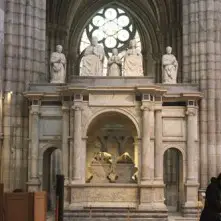
Tomb of Francis I and Claude of France
1547 – Death of Beatus Rhenanus (or Beatus Bild), humanist, classical scholar and friend of Erasmus, in Strasbourg. His works included a biograpy of priest and preacher Johann Geiler von Kaisersberg, a nine volume work on Erasmus, the Rerum Germanicarum Libri III and his editions of the work of Roman historian Velleius.
1554 – Philip of Spain arrived in England, at Southampton, in readiness for his marriage to Mary I.
1554 - John Knox, a leader of the Protestant Reformation in Scotland, published “A Faithful Admonition to the Professors of God's Truth in England”. Click here to find out more about this.
21 July
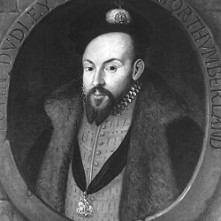
John Dudley, Duke of Northumberland
1553 – Arrest of John Dudley, Duke of Northumberland for his part in placing his daughter-in-law, Lady Jane Grey, on the throne.
1586 – Explorer Thomas Cavendish set sail from Plymouth on his South Sea voyage.
1601 – Burial of Peregrine Bertie, 13th Baron Willoughby of Willoughby, Beck and Eresby, at Spilsby Church. Bertie was the son of Katherine Willoughby (married names Brandon and Bertie), Duchess of Suffolk, who married his father, Richard Bertie, as her second husband.
22 July
1437/8 – Birth of John Scrope, 5th Baron Scrope of Bolton, soldier and a Councillor of Richard III. He was imprisoned after supporting pretender Lambert Simnel in 1487, but was pardoned in 1488.
1536 - Henry VIII's illegitimate son, Henry Fitzroy, Duke of Richmond and Somerset, died at St James's Palace. Click here to read more about him.
1549 – Robert Kett and protesters stormed Norwich and took the city, during Kett's Rebellion.
1576 – Baptism of playwright and pamphleteer, Edward Sharpham, at Colehanger, East Allington, in Devon. He is thought to have written the plays “The Fleire” and “Cupid's Whirligig”.
1581 – Death of Richard Cox, Bishop of Ely, at Downham in Cambridgeshire. He was buried in Ely Cathedral.
23 July
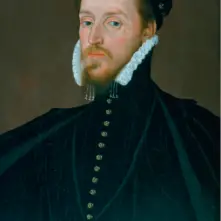
Henry Carey
1563 – Death of Cuthbert Vaughan, soldier and Muster-Master and Comptroller of the English garrison at Newhaven (actually Le Havre), from the plague.
1584 – Death of John Day, Protestant printer, bookseller and publisher of John Foxe's “Actes and Monuments” (“Book of Martyrs”), at Walden in Essex. He was buried at Little Bradley parish church in Suffolk.
1596 - Death of Henry Carey, 1st Baron Hunsdon, Privy Councillor and Lord Chamberlain, at Somerset House. Hunsdon was the son of William Carey and his wife, Mary Boleyn, sister of Anne Boleyn. Mary was mistress to Henry VIII at some point in the 1520s, and some people believe it is possible that Hunsdon was actually fathered by the King.
24 July
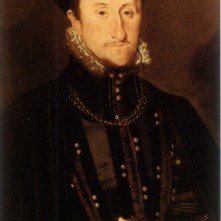
James Stewart, Earl of Moray
1553 – Birth of Richard Hesketh, merchant and conspirator, in Lancashire. In 1593, Hesketh urged Ferdinando Stanley, 5th Earl of Derby, to lead a rebellion to claim the throne of England, through his descent from Mary Tudor, Queen of France. Stanley turned Hesketh in, and the latter was executed on 29th November 1593.
1567 - Mary, Queen of Scots was forced to abdicate. Her one year old-son, James, became King James VI of Scotland with his uncle, Mary's illegitimate half brother, James Stewart, Earl of Moray, acting as regent.
1594 – John Boste, Roman Catholic priest and martyr, was hanged, drawn and quartered in Durham after being accused of leaving and re-entering England without permission. He was canonized in 1970 by Pope Paul VI.
25 July
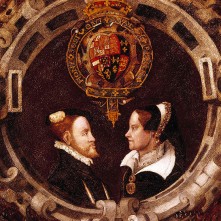
Mary I and Philip of Spain
1539 – Death of Cardinal Lorenzo Campeggio, diplomat, Bishop of Salisbury, Cardinal-Protector and Papal Legate. Campeggio was buried in Santa Maria in Trastevere, but in 1571 his remains were moved to the church of Santi Marta e Bernardino, the church he had built in Bologna.
1554 - Mary I married Philip of Spain, son of Charles V, the Holy Roman Emperor, in Winchester Cathedral.
1556 – Baptism of George Peele, poet and playwright, in St James Garlickhythe, London. Peele's works included the pastoral comedy “The Arraignment of Paris”, “The Battle of Alcazar” and “The Love of King David and fair Bethsabe: with the Tragedie of Absalon”.
1577 – Death of Nicholas Barham, Sergeant-at-Law and Queen's Sergeant, at Oxford. He was a victim of the Black Assize (gaol fever), a fever which killed around 300 people associated with the trial of Roland Jenkes, a recusant bookseller.
1602 – Burial of Salomon Pavy, actor, at the church of St Mary Somerset, near Blackfriars Theatre. Pavy was just thirteen years-old, and is thought to have been abducted to serve as an actor in the Children of Paul's. He later joined the Children of the Queen's Revels at the Blackfriars Theatre and had parts in Ben Jonson's “Cynthia's Revels” and “The Poetaster”.
1603 – Coronation of James I at Westminster Abbey. As Westminster Abbey points out "he was the first Scottish King to be crowned sitting on the Stone of Scone (contained in the Coronation Chair) for over 300 years".
26 July
1538 – Death of George Talbot, 4th Earl of Shrewsbury and 4th Earl of Waterford, at South Wingfield Manor, Derbyshire. He was buried at St Peter's Church, Sheffield.
1588 - 4,000 men assembled at Tilbury Fort, the fort built on the Thames estuary in Essex by Elizabeth's father, Henry VIII, in anticipation of a Spanish attack.
1614 – Death of Henry Grey, 1st Baron Grey of Groby, at Bradgate Park. He was buried in the family chapel.

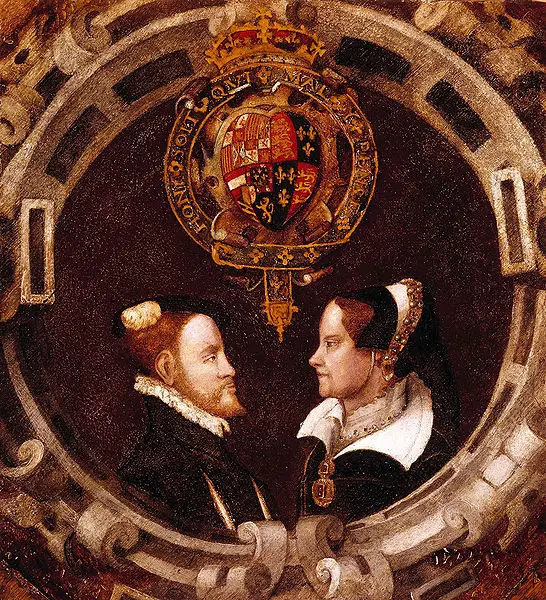
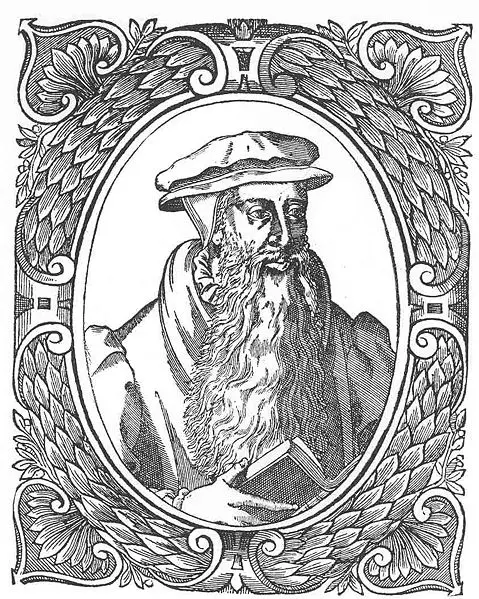
Just popping in to say the new website layout looks fantastic!
Thanks Olga!